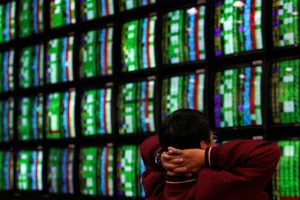(ATF) Financial markets were slammed after China moved to impose a new national security law to tighten its grip on Hong Kong, which investors feel would jeopardise its status as a global financial centre.
The US State Department has warned China this would imperil Hong Kong’s special status under US laws and US senators are seeking sanctions on China for impinging on Hong Kong’s independence.
Details of China’s move to amend Hong Kong’s security will be disclosed at the National People’s Congress, which has the introduction of security laws for Hong Kong on its agenda.
China opened the NPC, its annual parliamentary gathering, on Friday. Premier Li Keqiang told delegates there was a need to strengthen Hong Kong’s national security laws. In his speech, Li also abandoned setting any GDP target for economic growth for 2020 on account of the great economic uncertainty.
Louis Kuijs of Oxford Economics said: “The absence of a GDP growth target for this year confirms that, as we expected, policymakers accept that, after the plunge in Q1, economic growth will be low for 2020 as a whole even with a significant sequential recovery in Q2-Q4.”
“The low growth ambitions for this year reflect the fact that a big stimulus package remains unpopular in Beijing amid concerns about excessive leverage and financial instability. Nonetheless, the sizeable overall fiscal deficit target indicates significant policy support for the domestic recovery that we expect to continue despite the challenging external background. We expect year-on-year GDP growth to average 4% in H2.”
Hang Seng down 4%
Hong Kong led the region lower with the benchmark Hang Seng index tumbling 4%. Australia’s S&P ASX 200 index is down 0.4% and the Korean bellwether Kospi is off 1.12%.
Japan’s Nikkei 225 index was also down 0.44% after the Bank of Japan launched a new lending facility to support bank lending to small businesses, after leaving benchmark rates unchanged, as expected.
Marcel Thieliant, Senior Japan Economist at Capital Economics, said he expected the BOJ to keep both its policy rate as well as its target for 10-year government bonds unchanged for the foreseeable future, as it has indicated cutting policy rates could squeeze bank profitability at a time when banks have to grapple with rising loan losses.
“Together with the Bank’s additional 15 trillion yen in corporate bonds and commercial paper purchases, the lending facility announced today lifts the total support for corporate funding from the central bank to a sizeable 70 trillion yen, equivalent to 12% of the debt of non-financial firms. That amount is well above the support provided during the global financial crisis and the Great East Japan Earthquake and we suspect it will be sufficient to prevent widespread bankruptcies,” he said.
Overnight, Wall Street ended on a weak note with the S&P 500 falling 0.78%, Dow Jones Industrial Average slipping 0.41% and the Nasdaq Composite declining 0.97%.
Credit markets are in a risk-off mode with the Asia IG Index wider by 1 basis point at 106/107 bps. And China’s CDS was the regional under-performer with the 5-year contract wider by 2-1/2 basis points ay 49/50 bps.
























